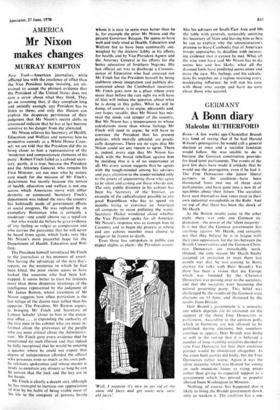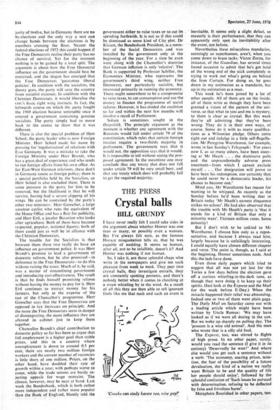GERMANY
A Bonn diary
Malcolm RUTHERFORD
Bonn—A few weeks ago Chancellor Brandt was fond of saying that if he had Harold Wilson's prerogative, he would call a general election at once and a socialist landslide would follow. He was unable to do it because the German constitution provides for fixed term parliaments. The events of the past few days have made it unlikely that he would use the prerogative, even if he had it. The Free Democrats—the junior liberal partners in the coalition—have been eliminated from two out of three state parliaments, and have gone into a new fit of squabbles about -their future. The socialists have seen themselves lose votes even in their own industrial strongholds in the Ruhr. And on top of that there has been the shock of Mr Heath.
As the British results came in the other night, there was only one German ex- planation—the power of the 'silent majority'. It is not that the German government has anything against Mr Heath. and certainly not that they believe he is in league with their own opposition, for the ties between the British Conservatives and the German Chris- tian Democrats are remarkably weak. (Indeed, the only reason Mr Heath finally accepted an invitation to meet them last month was that he was coming to Bonn anyway for talks with Herr Brandt.) Yet there has been a vision that the Europe which was founded by the Christian Democrats was passing over to the socialists, and that the socialists were becoming the natural governing party. This belief was challenged by the results of the German state elections on 14 June, and shattered by the results from Britain.
Herr Brandt's government is a minority one which depends for its existence on the support of the thirty Free Democrats in parliament. According to the opinion polls. which in Germany are not allowed to be published during elections, but somehow continue to appear. Herr Brandt was doing so well in the run-up that it is believed a number of long-standing socialists decided to vote Free Democrat for fear their coalition partner would be eliminated altogether. In the event both parties did badly, but the Free Democrats rather worse. Again it was the silent majority which was blamed for voting on such mundane issues as rising prices rather than giving its expected support to a government which has proved so popular abroad from Washington to Moscow.
Nothing, of course, has happened that is likely to bring the Brandt government down, only to weaken it. The coalition has a ma- jority of twelve, but in Germany there are no by-elections and the only way a seat can change hands between the elections is by members crossing the floor. Nearer the federal elections of 1973 this could happen if the Free Democrats realise their party has no chance of survival. Yet for the moment nothing is to be gained by a total split. The argument is about how the Free Democrat influence on the government should best be exercised, and the slogan has emerged that the Free Democrats 'guarantee liberal policies'. In coalition with the socialists, the theory goes, the party will save the country from socialist excesses. In coalition with the Christian Democrats, it would liberalise the cou's basic right wing instincts. In fact, the leftwards course on which the party fought the 1969 election became untenable once it entered a government containing genuine socialists. The party simply had to move back to the centre to show that it was different.
There is also the special problem of Herr Scheel, the party leader who is now Foreign Minister. Herr Scheel made his name by pressing for 'regularisation' of relations with East Germany. It was a mistake to take the Foreign Ministry under Herr Brandt, who has a great deal of experience and who tends to run foreign affairs from his own office. As for East-West German relations, these don't in Germany count as foreign policy; there is a special portfolio held by the Socialists, so Herr Scheel is also excluded there. There is some pressure in the party for him to be removed, but the likelihood is that he will survive, having had a severe clipping of his wings. He can be contained by the party's other two ministers: Herr Genscher, a large amateur cyclist who runs the equivalent of the Home Office and has a flair for publicity, and Herr Ertl, a jocular Bavarian who looks after agriculture. Both of them have become respected, popular, national figures; both of them could just as well be in alliance with the Christian Democrats.
The trouble for the Socialists is that between them these two really do have an influence on government policy. It was Herr Brandt's promise to lead a government of domestic reform, but he also promised—in deference to the Free Democrats—to do this without raising the taxes. Much of it, he said, was a matter of streamlining government and introducing cost-effectiveness. The result is that he finds himself promising reform without having the money to pay for it. Herr Ertl continues to extract money for his farmers, but only at the expense of the rest of the Chancellor's programme. Herr Genscher says that the Free Democrats are opposed to tax increases on principle. And the more the Free Democrats seem in danger of disintegrating, the more influence they are allowed in cabinet just to keep them together.
Chancellor Brandt's chief contribution to domestic policy so far has been to argue that full employment is a higher goal than stable prices, and this in a country where unemployment is down to around 0.5 per cent, there are nearly two million foreign workers and the current number of vacancies is little short of one million. Prices, on the other hand, have doubled their rate of growth within a year, with pethaps worse to come, while the trade unions are busily re- jecting appeals for wage restraint. The climax, however, may be near at hand. Last week the Bundesbank, which is both rather more independent and rather more popular than the Bank of England, bluntly told the
government either to raise taxes or to cut its spending forthwith. It is not as if this could be dismissed as some kind of City plot. Dr Klasen, the Bundesbank President, is a mem- ber of the Social Democrats and was installed by the government only at the beginning of the year. For a time he even went along with the Chancellor's doctrine that German inflation is only 'relative'. The Bank is supported by Professor Schiller, the Economics Minister, who represents the government's third wing, neither Free Democrat, nor particularly socialist, but interested primarily in running the economy. There ought somewhere to be a compromise to raise taxes, to cut consumption and use the money to finance the programme of social reform. However, it has eluded the coalition so far and within the next few months will involve a recall of Parliament.
Solace is sometimes sought in the Osipolitik. The principle argument at the moment is whether any agreement with the Russians would fall under article 79 of the constitution, which rules that certain foreign treaties require a two-thirds majority in parliament. The government says that it would not, the opposition says that it would. It is impossible to tell without seeing the pro- posed agreement. In the meantime one may conclude that any treaty that does not fall under article 79 will be very small beer, and that any treaty which does will probably fail to get the required majority.































 Previous page
Previous page